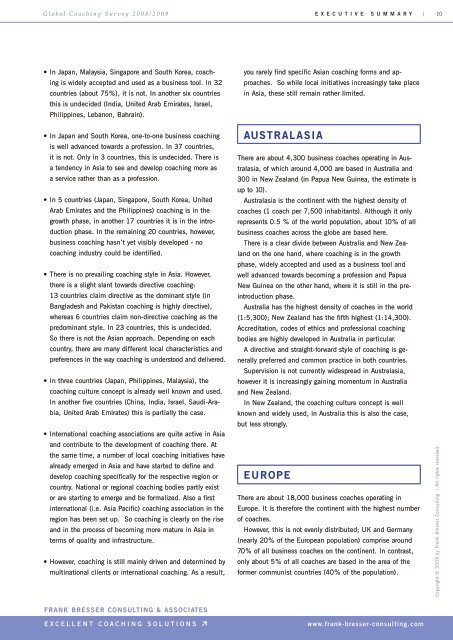Global Coaching Survey - Frank Bresser Consulting
Global Coaching Survey - Frank Bresser Consulting
Global Coaching Survey - Frank Bresser Consulting
You also want an ePaper? Increase the reach of your titles
YUMPU automatically turns print PDFs into web optimized ePapers that Google loves.
<strong>Global</strong> <strong>Coaching</strong> <strong>Survey</strong> 2008/2009 exeCutive SummaRy<br />
|<br />
• In Japan, Malaysia, Singapore and South Korea, coaching<br />
is widely accepted and used as a business tool. In 32<br />
countries (about 75%), it is not. In another six countries<br />
this is undecided (India, United Arab Emirates, Israel,<br />
Philippines, Lebanon, Bahrain).<br />
• In Japan and South Korea, one-to-one business coaching<br />
is well advanced towards a profession. In 37 countries,<br />
it is not. Only in 3 countries, this is undecided. There is<br />
a tendency in Asia to see and develop coaching more as<br />
a service rather than as a profession.<br />
• In 5 countries (Japan, Singapore, South Korea, United<br />
Arab Emirates and the Philippines) coaching is in the<br />
growth phase, in another 17 countries it is in the introduction<br />
phase. In the remaining 20 countries, however,<br />
business coaching hasn’t yet visibly developed - no<br />
coaching industry could be identified.<br />
• There is no prevailing coaching style in Asia. However,<br />
there is a slight slant towards directive coaching:<br />
13 countries claim directive as the dominant style (in<br />
Bangladesh and Pakistan coaching is highly directive),<br />
whereas 6 countries claim non-directive coaching as the<br />
predominant style. In 23 countries, this is undecided.<br />
So there is not the Asian approach. Depending on each<br />
country, there are many different local characteristics and<br />
preferences in the way coaching is understood and delivered.<br />
• In three countries (Japan, Philippines, Malaysia), the<br />
coaching culture concept is already well known and used.<br />
In another five countries (China, India, Israel, Saudi-Arabia,<br />
United Arab Emirates) this is partially the case.<br />
• International coaching associations are quite active in Asia<br />
and contribute to the development of coaching there. At<br />
the same time, a number of local coaching initiatives have<br />
already emerged in Asia and have started to define and<br />
develop coaching specifically for the respective region or<br />
country. National or regional coaching bodies partly exist<br />
or are starting to emerge and be formalized. Also a first<br />
international (i.e. Asia Pacific) coaching association in the<br />
region has been set up. So coaching is clearly on the rise<br />
and in the process of becoming more mature in Asia in<br />
terms of quality and infrastructure.<br />
• However, coaching is still mainly driven and determined by<br />
multinational clients or international coaching. As a result,<br />
FRank bReSSeR ConSultinG & aSSoCiateS<br />
exCellent CoaCHinG SolutionS<br />
you rarely find specific Asian coaching forms and approaches.<br />
So while local initiatives increasingly take place<br />
in Asia, these still remain rather limited.<br />
auStRalaSia<br />
There are about 4,300 business coaches operating in Australasia,<br />
of which around 4,000 are based in Australia and<br />
300 in New Zealand (in Papua New Guinea, the estimate is<br />
up to 10).<br />
Australasia is the continent with the highest density of<br />
coaches (1 coach per 7,500 inhabitants). Although it only<br />
represents 0.5 % of the world population, about 10% of all<br />
business coaches across the globe are based here.<br />
There is a clear divide between Australia and New Zealand<br />
on the one hand, where coaching is in the growth<br />
phase, widely accepted and used as a business tool and<br />
well advanced towards becoming a profession and Papua<br />
New Guinea on the other hand, where it is still in the preintroduction<br />
phase.<br />
Australia has the highest density of coaches in the world<br />
(1:5,300); New Zealand has the fifth highest (1:14,300).<br />
Accreditation, codes of ethics and professional coaching<br />
bodies are highly developed in Australia in particular.<br />
A directive and straight-forward style of coaching is generally<br />
preferred and common practice in both countries.<br />
Supervision is not currently widespread in Australasia,<br />
however it is increasingly gaining momentum in Australia<br />
and New Zealand.<br />
In New Zealand, the coaching culture concept is well<br />
known and widely used, in Australia this is also the case,<br />
but less strongly.<br />
euRope<br />
There are about 18,000 business coaches operating in<br />
Europe. It is therefore the continent with the highest number<br />
of coaches.<br />
However, this is not evenly distributed; UK and Germany<br />
(nearly 20% of the European population) comprise around<br />
70% of all business coaches on the continent. In contrast,<br />
only about 5% of all coaches are based in the area of the<br />
former communist countries (40% of the population).<br />
www.frank-bresser-consulting.com<br />
10<br />
Copyright © 2009 by <strong>Frank</strong> <strong>Bresser</strong> <strong>Consulting</strong> | All rights reserved.


